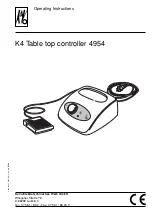
Safety
2.13.6 Display Accuracy of the Indices
On the right side of the monitor display the thermal and mechanical indices are displayed.
While scanning, notice the index numbers you are using and which controls affect the readings.
Try to keep the index numbers as low as you can, while maintaining diagnostic information within the
image. This is particularly important when scanning the fetus. The display accuracy of the mechanical
index and all thermal indices is 0.1. Values below 0.4 are not displayed.
Reference:
"Standard for real-time Display of Thermal and Mechanical Acoustic Output Indices
on Diagnostic Ultrasound Equipment", AIUM/NEMA, Washington, DC, 1992.
2.13.7 Recommendation to use and for the Need for following the ALARA
Principle
The AIUM publication "Medical Ultrasound Safety", published 1994 by the AIUM says the following
about the ALARA principle:
The ALARA principle "stands for 'As Low As Reasonably Achievable'. Following the ALARA
principle means to keep the total ultrasound exposure as low as reasonably achievable, while
optimizing diagnostic information.
With the new ultrasound equipment, the output display lets us determine the exposure level in terms of
the potential for bioeffects...", and "Because the threshold of diagnostic ultrasound bioeffects is
undetermined, it becomes our responsibility to control the total exposure to the patient. Controlling the
total exposure depends on output level and exposure time. The output level required for an exam
depends on the patient and on the clinical need. Not all diagnostic exams can be performed at very low
levels. In fact, using too low levels may result in poor data and the need to repeat the examination.
Using too high a level may not increase the quality of the information, but it will expose the patient to
unneeded ultrasound energy."
"Ultimately, the exposure time depends on the person conducting the exam. Primarily, it's our training,
education, and experience that determine how quickly we can obtain a useful image, and thus, the
length of the exam and the amount of exposure. So, the question is 'How much time do we need to
obtain the desired diagnostic information?'" The AIUM also lists some other factors that might affect
the length of exposure time, like if there is a moving or a stationary beam, what kind of transducer is
chosen, what is the body characteristic of the patient, if the operator is understanding the controls of
the system, and how they affect output levels, whether it's continuous or pulsed, or color flow Doppler.
"To achieve ALARA, we need a thorough knowledge of the imaging mode, transducer capabilities,
system setup, and operator scanning techniques."
GE Medical Systems-Kretztechnik Ultrasound therefore recommends careful studying of the
system's manual to become familiar with the operating controls and output display of the system
as well as with following the ALARA principle. This might decrease the risk of any potential
biological hazard caused by ultrasound exposure during an examination!
Reference:
Medical Ultrasound Safety, AIUM 1994
AIUM Executive Office
14750 Sweitzer Lane,
Suite 100, Laurel, MD 20707-5906, USA
Please note that the above referenced AIUM publication is attached to this manual.
Voluson
®
730 - Instruction Manual
2-16
105838 Rev. 3
















































